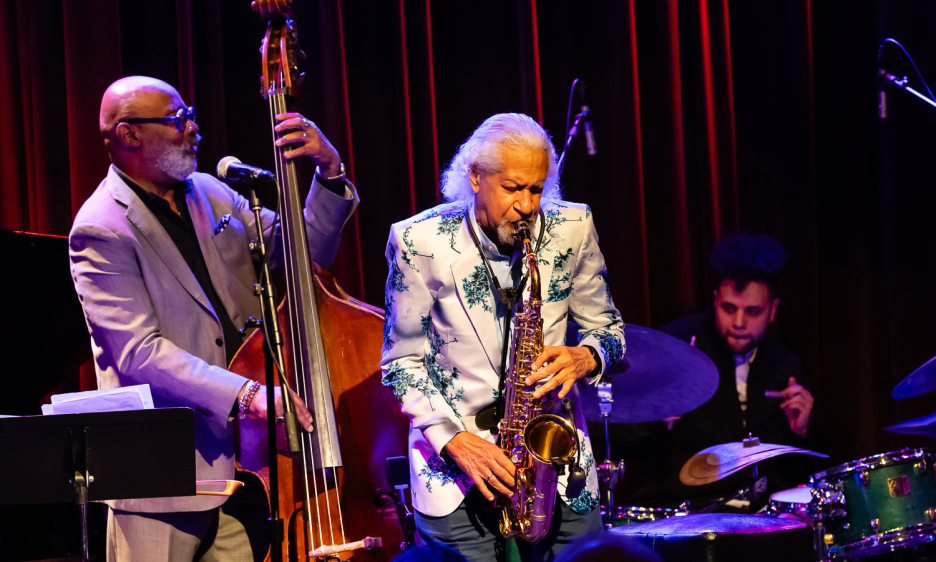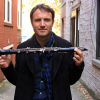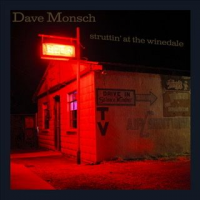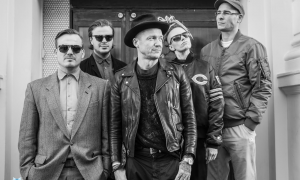Home » Jazz Articles » Live Review » Gary Bartz Quintet at Jazz Alley
Gary Bartz Quintet at Jazz Alley

Courtesy Lisa Hagen Glynn
He approached each chorus as would a poet composing free verse; each line alluded to a notion that wasn’t completed until the final notes of the verse were sounded.
Jazz Alley
Seattle, WA
April 29, 2025
As an alto saxophonist, NEA Jazz Master Gary Bartz has merged freedom and form in historic fashion, in the process acquiring an understanding of the art of improvisation, or what Bartz refers to as "informal composition," in a unique and enlightened way. His vital expressionism has traveled from hard bop to Latin, to fusion in a seamless progression that has enabled a boundless journey that cast light into the darkness of the jazz unknown.
The Baltimore-born and raised Bartz first appeared on the scene as a member of Max Roach and Abbey Lincoln's band in 1964. A stint as a member of Art Blakey and the Jazz Messengers followed, moving forward as a vital part of Miles Davis' fusion movement that saw him perform with the legendary jazz master at the Isle of Wight festival and appear on the recording Live-Evil (Columbia, 1971). In the studio, the master altoist has released 45 albums as a leader, and has appeared on more than 200 as a side musician.
The now 84-year-old Bartz is once again on tour, preceding the release of a new recording in 2025. He rolled into springtime Seattle leading an explosive quintet possessing the spirit to branch out into a myriad of ideas and conceptions of the jazz legacy.
During an eighty minute set, the quintet dove into a performance that brought post-bop sensibilities together with Bartz' passive humanity expressed both through his horn and voice. Mainly focused on alto, the iconic saxophonist shifted to soprano on occasion, still conjuring his distinctive tonality that has defined his sound through decades of time. The message got across to the audience that the spirit music that has descended from John Coltrane to messengers of the sound like Bartz casts still a vibrant flame, affected yet emboldened by age and wisdom. His sound answered an inquiry in the collective mind of the audience gathered. In witnessing the elders of this music perform, there is always the concern of whether they still possess the ability to take us to places that touch us deeply, even spiritually. The Seattle jazz community hadn't seen the altoist perform in the Emerald City since he appeared with the late McCoy Tyner at Jazz Alley in 2016. Witnessing Bartz work his way through swinging phrases, or through a deep dive into the melancholic sentimentality of a ballad is still a thrilling ride for a jazz audience, one that was greatly facilitated by a fine gathering of musicians in support and collective participation.
The superb rhythm section featured the veteran tandem of pianist Marc Cary and bassist Gerald Cannon, two musicians who stood side by side on the Jazz Alley stage in the '90's with the late, great Roy Hargrove. Surprisingly, drummer Kassa Overall, a Seattle native and alum of the storied jazz program at Garfield High School, was appearing on the iconic stage for the first time. His deft touch lent the quintet passion and fire with refinement, in read-and-react mode with the comping of Cary, and the constant yet pliable and thundering bass lines set down by Cannon.
The set began with the band settling on a blues groove, with the marvelous guitarist Paul Bollenback gently adding nuance with slide, while Bartz intervened with sharp, short bursts. The saxophonist then added a voiced narrative exclaiming gently, "Sadness must leave this room, bad thoughts gotta leave, evil and bad thoughts." The music then morphed into a blend of bebop, funk and modal forms, embracing the informal conversation between the five participants for an uninterrupted 80 minutes. Throughout the set, the interplay between Bartz and Bollenback was ever present, with probing altoisms and the guitarist's brilliant use of lightning runs and chordal insertions seemingly performed with relative ease.
When the band slipped into Michel Legrand's classic ballad, "You Must Believe in Spring," one's attention was immediately drawn to Bartz, and the tenderness of his sound. He approached each chorus as would a poet composing free verse; each line alluded to a notion that wasn't completed until the final notes of the verse were sounded. Bollenbach played piano-like voicings in artful fashion, blending chordal accompaniment with Cary's sparse, artful offering.
Bartz reached back into the early '70s with "I've Known Rivers," a Langston Hughes-inspired tune from his days with the celebrated NTU Troop. The lyrics seemed somehow analogous to the depths in which Bartz has probed the music for more than 60 years. It seemed to embody lessons learned from Roach, Blakey, Davis, Tyner, and all of the masters that have mentored him and enabled him to master his own sound and become the teacher that, in turn, imparts that wisdom to generations of musicians.
"Rivers I have seen and rivers I have known/Ancient than the world and older than the blood I've known rivers, I've known rivers."
Bartz paid homage to Andy Bey, who had passed three days prior with a heartfelt dip into Bey's spiritual, "Celestial Blues." Playing in duo with Bollenback, Bartz switched to soprano, struggling to find his way through the first verse, before finding his striking sound on the higher-pitched horn and delivering Bey's melody in bright and harmonious fashion.
The quintet's dive into "Pure Imagination," was a delightful surprise. At first struggling to place the melody, the audience soon realized the tune comes from "Willy Wonka and the Chocolate Factory," and was sung by none other than Wonka himself, the late and wonderful Gene Wilder. While the tune has been covered by many, Barbra Streisand among them, the thematic narrative it relates is plainly in line with the message Bartz conveys in each and every chorus he approaches.
"Come with me/and you'll be/n a world of pure imagination. We'll begin/with a spin/traveling in the world of our creation."
The same could be said about Bartz' finale, ending with his "Song of Loving Kindness." While lyrically expressing the oneness of humanity through the lens of kindness, the sentiment is one that was a constant presence in every note played and every word sung by the master. While his insertion of tunes that include his poetic vocal prowess convey a narrative in no uncertain terms, that literal message is one that cannot be separated from the stories that Bartz tells musically on the alto saxophone. It is a message of love, of kindness, of embracing the beauty of the universe in loving humility, giving thanks and inviting anyone within earshot to join. For one spring evening in Seattle, a few hundred of us were able to receive his message and take it with us. It was plainly a gift of pure imagination.
Tags
Live Review
Gary Bartz
Paul Rauch
United States
Washington
Seattle
Max Roach
Abbey Lincoln
Art Blakey
Miles Davis
John Coltrane
McCoy Tyner
Marc Cary
Gerald Cannon
Roy Hargrove
Kassa Overall
Paul Bollenback
Andy Bey
PREVIOUS / NEXT
Support All About Jazz
 All About Jazz has been a pillar of jazz since 1995, championing it as an art form and, more importantly, supporting the musicians who make it. Our enduring commitment has made "AAJ" one of the most culturally important websites of its kind, read by hundreds of thousands of fans, musicians and industry figures every month.
All About Jazz has been a pillar of jazz since 1995, championing it as an art form and, more importantly, supporting the musicians who make it. Our enduring commitment has made "AAJ" one of the most culturally important websites of its kind, read by hundreds of thousands of fans, musicians and industry figures every month.




























